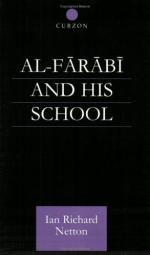|
This section contains 5,088 words (approx. 17 pages at 300 words per page) |

|
SOURCE: Gyekye, Kwame. “Al-Fārābi on the Logic of the Arguments of the Muslim Philosophical Theologians.” In Journal of the History of Philosophy 27, no. 1 (January 1989): 135-43.
In the following essay, Gyekye focuses on a treatise written by al-Fārābī concerning the logical structures used by Muslim philosophical theologians.
Introduction
My intention in this paper is to discuss those portions of al-Fārābī's treatise—mistitled by Nicholas Rescher as Al-Fārābī's Short Commentary on Aristotle's Prior Analytics1—which bear on certain methods of logic generally preferred, appropriated and developed by the Muslim philosophical theologians, Mutakallimūn (rendered also as dialectical or rationalist theologians). Logic, as a rational system relevant and valuable in arguments, was a subject that held some attraction for the Muslim philosophical theologians, who regarded it as an organ, a tool (āla) which would provide their religious doctrines with an impregnable...
|
This section contains 5,088 words (approx. 17 pages at 300 words per page) |

|


